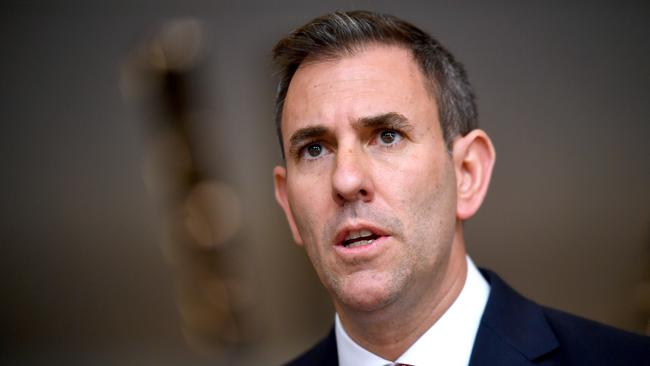
Jim Chalmers is flying to Washington this week for meetings of the International Monetary Fund and World Bank Group ahead of Labor’s first budget. Central banks and governments are having a war of words about who is responsible for prevailing economic conditions. Finance ministers might be tempted to take comfort in IMF emphasis on external shocks as the cause. This will only prolong the pain.
While governments and central banks share responsibility for getting us to this point, citizens are contributing by relying on the state to meet our basic needs.
An understudied part of nanny-state culture is the role of individuals in creating demand for it. Many people make health choices that result in largely preventable illnesses that are cured on the public purse. Many special-interest groups represent people who are equal under law yet they plead poverty and demand taxpayer funding while knowing their clients spend much of the money on drink and drugs. There are many who think nothing of using Medicare, taking benefits or drawing on the pension when they could afford to pay their own way. Others exploit the National Disability Insurance Scheme with no thought about how it affects fellow Australians. Older generations were raised to believe the state could support them in times of dire need. Younger generations believe it should.
If the Treasurer stands any chance of reducing the debt and deficit, he will need to loosen the apron strings. The process has begun by playing down expectations. On Friday, Chalmers delivered an address to the Queensland Investment Showcase. He outlined what will be the prelude to a bread-and-butter budget: the global economic outlook is deteriorating and Australia is not immune to it, but we must maintain confidence to ensure business investment given our reliance on commodities.
Economists are revising their optimistic outlooks on the prospect of recession, but it takes a Dr Doom to shatter the illusion of an easy exit. Nouriel Roubini predicted the 2008 financial crisis and he says a “long and ugly” recession in the US will lead to global recession. In an interview with Bloomberg, Roubini predicted “a real hard landing” where the S&P 500 could fall by 40 per cent. Writing for Project Syndicate last week, Roubini said while Covid had contributed significantly to economic decline through lockdowns and supply chain, it came “on top of excessively loose monetary, fiscal, and credit policies”. Central banks and governments have played their part.
After offering assurance that rates would not rise until 2024, the Reserve Bank is hesitant to go too fast too soon. Last week the RBA raised the cash rate by 25 basis points to 2.6 per cent.
Guardian Australia economics correspondent Peter Hannam wrote: “Not stated but implied by both Chalmers and the RBA is that the government and the central bank have been working in sync … The RBA governor, Philip Lowe, also did his bit.”
But nearly a century of boom-and-bust cycles has taught us the exit from high inflation is narrow and the principles for economic recovery are little changed. Margaret Thatcher won three consecutive terms as British prime minister by making economics a matter of public interest and presenting the facts in plain speech. She believed inflation was caused by governments and thrift was the foundation of economic recovery.
In a 1974 speech as a youngish MP, she distilled the problem: “When the money supply grows too quickly, inflation results. This has been known for centuries. Until a few years ago, I should not have had to labour the point.” Nearly 50 years later, many economists remain unconvinced.
In a recent speech to Bloomberg in Sydney, RBA deputy governor Michele Bullock sought to assure people that although the bank was in negative equity and would be considered bankrupt if it were a commercial enterprise, “central banks are not like normal banks”. She explained commercial banks must ensure their assets were sufficient to meet any liabilities, but the RBA was protected by legislation so “the government provides a guarantee against the liabilities of the bank”. She said: “Since it has the ability to create money, the bank can continue to meet its obligations.”
It is understandable that central banks are under greater scrutiny. Inflation is a grim reaper and while economic contractions are natural after periods of plenty, the RBA provided questionable advice at a critical juncture. However, unless the government commits to reducing the debt and deficit by spending less and saving more, Australia will have a harder landing than necessary.



Inflation is more than a money problem. It can affect the enterprise of youth, the peace of households, quality of life and long-term health. Left unchecked, it can give rise to a politics of resentment that breeds mistrust in democratic institutions. It can drive people to seek desperate solutions in crime, addiction or the illusory certainty of absolutist beliefs. It is for these reasons the focus on finding the culprit of inflation must be matched by a determination to drive it down. Labor is in the driver’s seat.